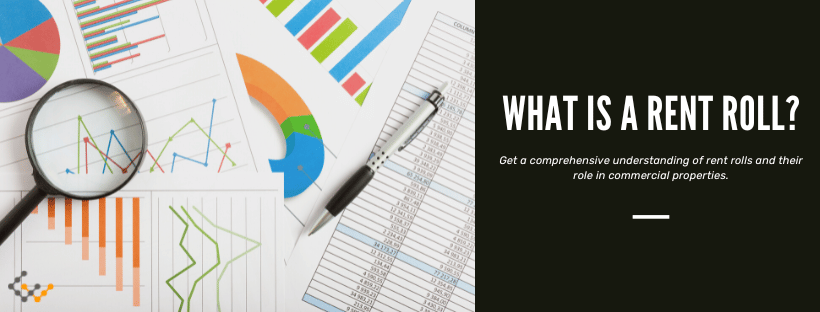What is a Rent Roll? How is it Used in Commercial Real Estate?

Any potential lender or investor needs to utilize commercial rent roll in the evaluation of any property. It provides insight into if the property is a good risk or not.
That is why commercial property rent roll tends to be one of the first things investors ask for when considering the investment into the property. It contains a significant amount of information about the tenants and the properties. Here is what it is and how it works.
What Is a Rent Roll?
A rent roll in commercial real estate is often provided in a spreadsheet or another document. It outlines the details about the investment property, including the number of units, tenant information, rental details, and other valuable information.
The rent roll document is vital because it can help investors and lenders determine the value of the property. It is also rather easy to read. Instead of having to work through dozens of documents and leases, the rent roll organizes all of the details of each property thoroughly, making it more focused on value and numbers.
Answer a few questions and get custom mortgage quotes. We'll match you with offers from our network of 650+ lenders.
What Does a Detailed Rent Roll Include?
Commercial rent roll lists all of the important details about the property’s tenants. That typically includes:
- Each of the tenant’s names
- The unit number or other identification of their location
- The size of each of the units
- The amount of rent charged per unit
- Amenities or unique features of the property
- The length of each lease
- The percentage of net rental square footage
- The annual rent for the property
- Security deposit information
Any other specific or valuable information may also be noted. This helps in the determination of the value and potential income for each of the units. The rent roll will include this information about every tenant and unit at the property, no matter if it is currently rented or vacant.
The rent roll commercial property documents can vary somewhat from one property to the next, depending on the specifics of the ownership. However, most of these documents contain the details of the property that help define its overall value.
Why Is Rent Roll Important for Commercial Investors?
For all investors, commercial rent roll is a valuable tool. Using this spreadsheet, owners are able to clearly see all of the details of the property and use that data to determine the worth of that property, whether they should raise the rent, and whether there is profit in the property itself.
For those considering the investment in the property, this tool is a core component of the due diligence process. It helps with understanding the income potential of the property and also for each unit. With it, the investor can determine if this property has the potential to meet their financial needs and objectives.
With commercial property rent roll, an investor can see key details, including:
- The income the property generates: This is a sum of the rent paid by tenants for the year, generating a clear picture of what annual income will be. This can help to estimate net operating income and net cash flow.
- Expiration concentrations: Investors and owners can plan for concerns such as numerous leases expiring at one time, which could create a vacancy problem.
- Tenant concentrations: In multifamily properties or commercial properties with numerous tenants, the tenant concentration depicts how much of the rental space is aligned with a single tenant, which can help to determine risk should that tenant leave.
- Lease lengths: This data helps investors have a good idea of how long the rental income for that property will remain in place and steady, as long-term leases tend to mean more financial stability for investors.
- Tenant roaster: This provides insight into who is using the property, which is beneficial, especially in commercial properties where it can provide insight into the overall strength of that renter and potential longevity.
- Vacancy and occupancy information: This can help with the determination of demand for the property, especially for investors who may be looking for specific financial goals.
Who Needs a Rent Roll and How Are They Used?
Commercial property rent roll is a valuable tool for many people, including:
- Investors considering the purchase of the property who wish to better understand its value
- Lenders who are considering offering a loan to cover the purchase of the property
- Current owners who want to understand the value of the property and compare it to others in the region
This data, when kept up to date, can serve as a valuable tool in determining the long-term profitability and security of the property. It can also help individuals to make wise financial decisions based on facts about the property’s current and short-term past financial state.
How Is a Rent Roll Useful to Property Managers?
Property managers can utilize commercial rent roll in numerous ways to maintain a healthy and updated view of the property. For property managers, some of the specific benefits it offers include the following:
- A way to monitor the overall financial health of the property by knowing details about tenants, leases, and rentable space
- A resource for comparing the property to others in the area to determine if rent is over or underpriced
- Helping to keep property owners up to date on the financial aspects and health of the property itself, including how profitable it is
Property managers can use this tool to easily view rent and lease terms as well as the overall features of each unit for any need.
How Do Commercial Property Buyers Benefit from Using a Rent Roll?
As a commercial property investor or buyer, it is critical to complete due diligence before deciding to invest. A core component of that process is understanding the financial health of the property. That includes how much rent it is bringing in, how long the leases of current tenants remain in place, and how much rentable space is available.
The details of the CRE rent roll can also inform buyers about the possibilities, for example, if they will need to make significant rent increases to existing leases to bring the property up to a profitable level. If the property is not fully rented, the buyer may want to consider why that is and how well the property compares with others in the market.
Commercial property buyers can also use this information to compare more than one property to each other to determine which may be more profitable or offer the best long-term opportunity.
How Does a Rent Roll Help Landlords?
Landlords utilize the information from commercial property rent roll to maintain oversight of their property. A quick look at the rent roll can answer key questions such as:
- When is a tenant’s lease up?
- How much is the property bringing in annually, and how does that compare with operating expenses?
- What features one property has compared to another that could justify a rent increase or higher value?
Wrapping Things Up
Commercial property owners, investors and property managers will find this rent roll document to be one of the most important investment tools they have. It can answer many questions for them, provide guidance on profitability and needed changes in rent to keep the property competitive, and even help them determine the financial performance of their property over a period of time.

